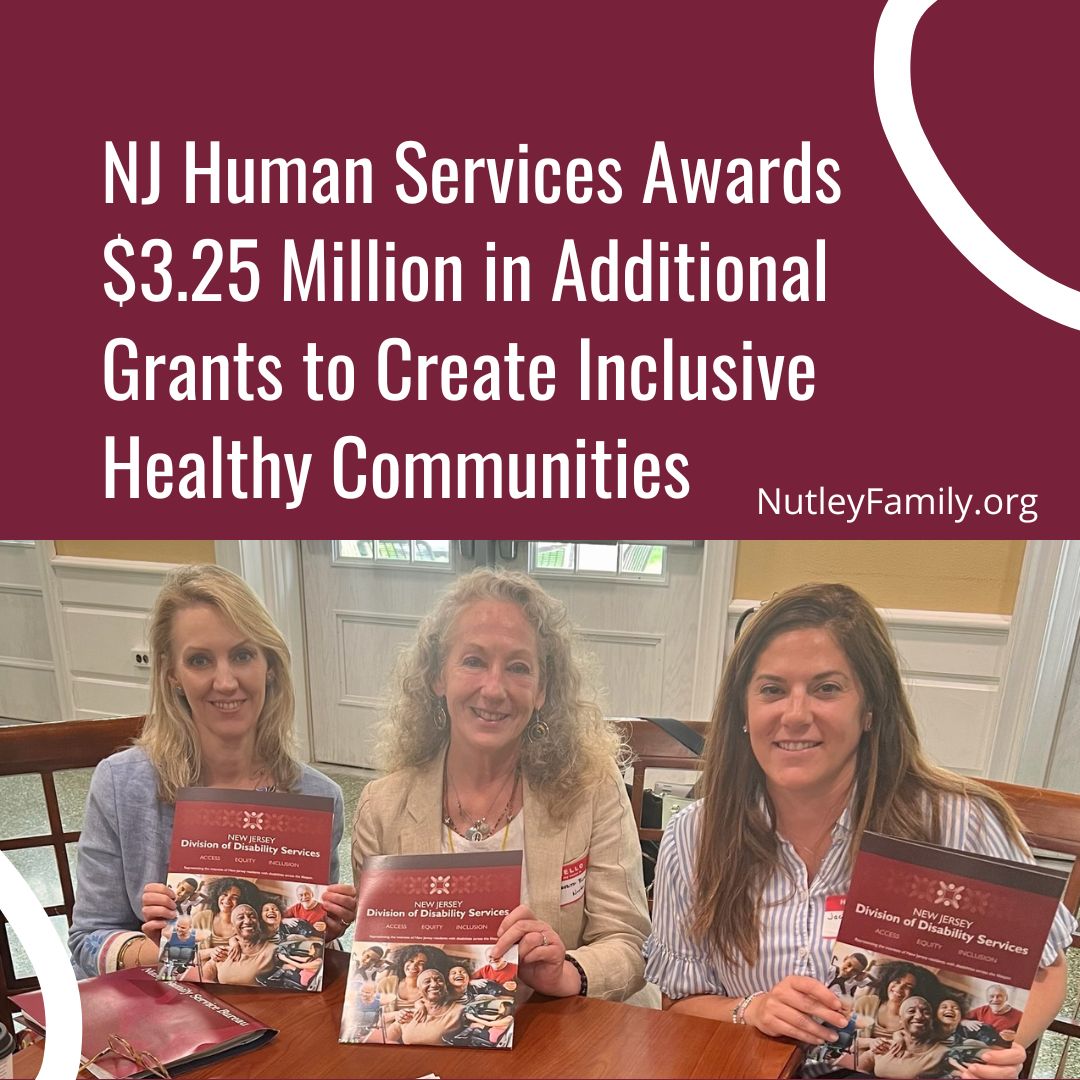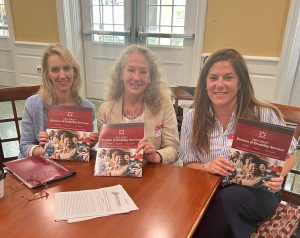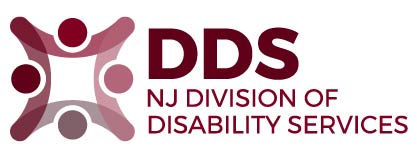-
NJ Human Services Awards $3.25 Million in Additional Grants to Create Inclusive Healthy Communities
- Posted on July 11, 2023
- by admin
- in All Articles, NFSB Blog
- Comments Off on NJ Human Services Awards $3.25 Million in Additional Grants to Create Inclusive Healthy Communities
 Since January 2021, $7.4 Million in Total Grants Have Been Awarded to 32 Organizations to Help Improve the Overall Health of Individuals with Disabilities
Since January 2021, $7.4 Million in Total Grants Have Been Awarded to 32 Organizations to Help Improve the Overall Health of Individuals with Disabilities
Previously published on Inclusive Healthy Communities Website and The Official site of the State of New Jersey at nj.gov
June 27, 2023(TRENTON) – Commissioner Sarah Adelman today announced the Department has awarded an additional 13 grants to help organizations across the state implement inclusive initiatives that support individuals with disabilities in the communities in which they live, work, learn, and play.
“The IHC Grant Program continues to invest in both innovative and evidenced-based ideas that promote healthier and more inclusive New Jersey communities,” Commissioner Sarah Adelman said. “We are excited to support the 2023 grantees as they work to improve health outcomes and provide meaningful opportunities for individuals with disabilities in the places in which they live and work. We look forward to seeing these projects come to fruition and are proud to have the Bloustein School of Planning and Public Policy at Rutgers University as a partner in this effort.”
First launched in January 2021, the IHC Grant Program is an initiative spearheaded by the NJDHS Division of Disability Services to support communities and ensure the voice and needs of individuals with disabilities are included in healthy community planning. The grant program is available to non-profits, and local county or municipal government agencies.
“For more than two years, the IHC Grant Program has worked to create spaces that are accessible for all, not just individuals with disabilities. These additional grants solidify Human Services’ drive to build changed environments where spaces that are accessible for all is seen as the new norm and is imbedded in the fabric of our state,” Deputy Commissioner for Aging and Disability Services Kaylee McGuire said. “Building inclusive communities is a holistic endeavor, which is why it is so important to continue this momentum and add more creative and innovative solutions in this impactful effort. The proposed work of the awardees does just this.”
“Individuals with disabilities often experience adverse socioeconomic outcomes and health disparities. The IHC Grant Program has and will continue to address these challenges by encouraging inclusive policies, full community engagement and accessible environments that support and improve the health of people with disabilities,” Executive Director Peri L. Nearon said, who directs the Division of Disability Services that oversees this initiative. “We believe that the effect of this ongoing work will impact generations to come and inspire others to create change.”

The following organizations were selected to receive grant funding under the Division of Disability Services’ (DDS) Inclusive Healthy Communities Grant Program (IHC):
- Appel Farm is a year-round, non-profit performing arts facility serving Cumberland and Salem Counties. Using IHC funds, they will upgrade key elements of their 115-acre campus to create a more inclusive arts learning environment for individuals with disabilities.
- The ARC of Monmouth will implement Arc and the Beanstalk, with their partners No Limits Café and the local Eagle Scouts of Monmouth County. This includes instruction on how to raise healthy food; building accessible, raised garden beds; preparing healthy meals with the food that is grown; and serving meals to residents facing financial challenges through their Help for Hunger Program.
- Atlantic Center for Independent Living will develop and offer workshops for individuals with disabilities to build skills and foster civic involvement to facilitate their fuller participation in public policy and decision-making within their own communities.
- Borough of Freehold will build upon a previous IHC grant to continue the Freehold Improving Patient Access Implementation Project, which addresses the lack of access to health care for people with disabilities within the community. Through a collaborative approach between the Borough of Freehold, the Freehold Family Health Center, and Neighborhood Connections to Health, this project aims to make access to health care more equitable and inclusive, thus, closing the gap of health care accessibility for individuals with disabilities.
- Bright Side Family will implement Community Begins at Home in Teaneck, focusing on housing accessibility and social inclusion challenges faced by older adults and people with disabilities. Activities include designing a survey, creating an outreach plan, and devising best practices for the home health and safety assessments that will be key tools in building community capacity, maintaining independent living, and strengthening community engagement.
- Children’s Specialized Hospital will build upon a previous IHC grant by implementing Learn to Live Safely with Disabilities and Special Health Needs, embedding inclusive and accessible education and practices within New Jersey academic and municipal systems; training service providers, emergency responders and disabled residents; and expanding exposure to Living Safely in under-resourced communities.
- Jewish Community Center on the Palisades will work on facility improvements, creating accessible ways to engage in sports that are adaptive and safe. They will transform their existing outdoor basketball court into an adjustable multi-sport court, providing opportunities for physical fitness and wellness with a focus of inclusion and supportive programming.
- New Jersey Conservation Foundation will make more accessible trails on the preserves it manages; communicate to the public that these trails are available for use; and encourage individuals with disabilities to come out and enjoy them by offering inclusive, guided hikes.
- Nutley Family Services Bureau will build upon a previous IHC grant and focus on increasing access to resources that address the social determinants of health; addressing accessible affordable housing and accessible public spaces; and creating a community-based inclusive mental health and peer support training center as well as a community advisory group on inclusion.
- Raritan Valley YMCA will create a fully accessible aquatic facility by developing appropriate programming and comprehensive staff training in order to teach swimming and water safety to ethnically, racially, and ability-diverse community members. Partnering with the Raritan Bay Area YMCA, the YMCA State Alliance, and the National YMCA, they will create a model for other organizations to implement their own inclusive swim programs.
- Spectrum for Living will help individuals with disabilities build capacity and power to potentially influence decision making, serve on boards and advance employment opportunities. The grantee has visions for this to grow into a powerful leadership program for civic engagement for individuals with disabilities at the local, municipal, or county level.
- Wood Services, Inc. will build upon a previous IHC grant and improve health care for people with disabilities through a program that will build a power sharing relationship between individuals with disabilities and their service providers.
- Young Audiences will build upon a previous IHC grant and work on United We Discover, which is a school-based arts residency for students with disabilities as well as their classmates, educators and families. The program aims to increase positive perceptions of disabled identities; increase inclusive and equitable educational experiences in school; and build connected communities.

The Bloustein School of Planning and Public Policy at Rutgers University partners with DDS to manage the IHC grant program and provide technical assistance to grant recipients in implementing projects across New Jersey.
The program aims to promote change at the local level by addressing pre-existing physical, environmental, social, and economic challenges that prevent people with disabilities from having full access to the conditions that support health and well-being.
Under the program, applicants were able to submit proposals for grants of up to $250,000, which will fund efforts for two years. Funds used may not exceed $125,000 per year.
Work for this funding cycle begins this July through June 2025, allowing grantees 24 months to implement proposed work plans.
 The Division of Disability Services bridges the gap for those with adult onset disabilities in need of services. It also creates and publishes New Jersey Resources, a comprehensive guide to services available throughout the state. Download a copy here. The Division also offers assistance through its toll free hotline, 1-888-285-3036.
The Division of Disability Services bridges the gap for those with adult onset disabilities in need of services. It also creates and publishes New Jersey Resources, a comprehensive guide to services available throughout the state. Download a copy here. The Division also offers assistance through its toll free hotline, 1-888-285-3036.
If you enjoyed this article please consider sharing it!
Archives
- April 2024
- March 2024
- February 2024
- January 2024
- December 2023
- November 2023
- September 2023
- August 2023
- July 2023
- June 2023
- May 2023
- April 2023
- March 2023
- February 2023
- January 2023
- December 2022
- November 2022
- October 2022
- September 2022
- August 2022
- July 2022
- June 2022
- May 2022
- April 2022
- March 2022
- February 2022
- January 2022
- December 2021
- November 2021
- October 2021
- September 2021
- August 2021
- July 2021
- June 2021
- May 2021
- April 2021
- March 2021
- January 2021
- December 2020
- November 2020
- October 2020
- September 2020
- August 2020
- July 2020
- June 2020
- May 2020
- March 2020
- January 2020
- November 2019
















